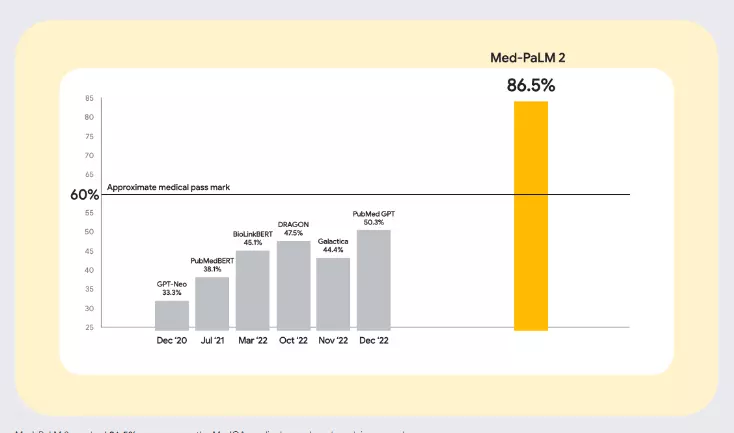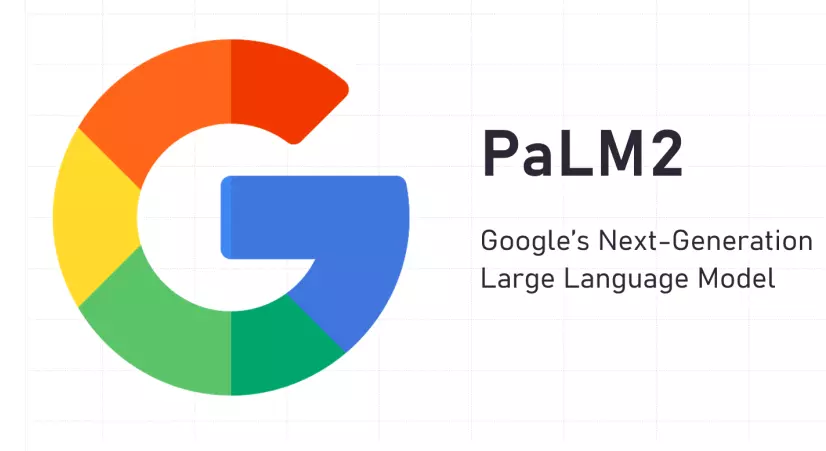Index
Introduction
Med-PaLM 2: Transforming Healthcare Through AI Innovation
In the ever-evolving landscape of healthcare, artificial intelligence (AI) has emerged as a transformative force, reshaping the way medical professionals diagnose, treat, and understand various medical conditions. Leading this paradigm shift is Med-PaLM 2, an innovative AI model designed to assist healthcare practitioners in making accurate diagnoses, formulating precise treatment recommendations, and even expediting drug discovery processes. In this comprehensive exploration, we delve deep into the multifaceted potential of Med-PaLM 2 and its profound impact on the medical field, covering its accessibility, diverse applications, impressive accuracy, ethical implications, and role in shaping healthcare's future. We will also touch upon its connection with Google's AI language model, Bard.
Is Med-PaLM 2 available?
Med-PaLM 2, with its potential to revolutionize healthcare, is currently accessible to a select group of healthcare organizations and research institutions. Google, the driving force behind Med-PaLM 2's development, has plans to make it more widely available to a broader audience in the near future. This expansion of access holds the promise of democratizing advanced healthcare solutions and making them accessible to a wider range of healthcare professionals, ultimately benefiting patients across the globe.
What is the use of Med-PaLM 2?
One of the most remarkable features of Med-PaLM 2 is its versatility. It finds application in various domains within the medical field, each with the potential to reshape how healthcare is delivered:
- Diagnostic Precision: Med-PaLM 2 stands out in its ability to assist healthcare professionals in diagnosing medical conditions with unparalleled accuracy. By meticulously analyzing patient records, medical images, and relevant clinical data, Med-PaLM 2 contributes to quicker and more precise diagnoses. This enhanced diagnostic accuracy can lead to early intervention, ultimately improving patient outcomes.
- Tailored Treatment Plans: Beyond diagnosis, Med-PaLM 2 excels in helping healthcare practitioners craft personalized treatment plans for patients. By considering an individual's medical history, current health status, and other pertinent factors, Med-PaLM 2 empowers practitioners to design treatment regimens that are not only more effective but also better suited to the patient's unique needs.
- Accelerating Drug Discovery: Drug discovery is a time-consuming and resource-intensive process, but Med-PaLM 2 is poised to change that. Its predictive capabilities can identify potential drug targets and assess the properties and potential side effects of new pharmaceutical compounds. This acceleration in drug discovery has far-reaching implications for the development of innovative medications and therapies.
- Efficient Clinical Trials: The design and execution of clinical trials are pivotal in evaluating the safety and efficacy of new treatments. Med-PaLM 2 streamlines this process, helping researchers develop clinical trials that are not only more efficient but also more effective in collecting meaningful data. This efficiency can translate into quicker access to groundbreaking treatments for patients.
How accurate is Med-PaLM 2?
Med-PaLM 2's remarkable accuracy is a testament to its potential to transform healthcare. For instance, when tested on the MedQA dataset of US Medical Licensing Examination (USMLE)-style questions, Med-PaLM 2 achieved an accuracy rate of 86.5%. This impressive performance surpasses the accuracy of human experts, who typically score around 70% on the same dataset. This significant leap in accuracy underscores the potential of AI models like Med-PaLM 2 to revolutionize medical diagnosis, providing a level of precision that can redefine patient care.

Ethical Considerations: Navigating the AI Healthcare Frontier
The integration of AI into healthcare presents a unique set of ethical considerations that must be navigated thoughtfully and responsibly. Google, as a pioneer in AI development, has been diligent in addressing these ethical concerns in the development of Med-PaLM 2:
- Fairness and Bias: Ensuring fairness and mitigating bias is of paramount importance. Med-PaLM 2 has been carefully designed to minimize bias by training on diverse datasets that encompass the full spectrum of human variation. This commitment to fairness ensures that AI-driven healthcare remains equitable and inclusive.
- Transparency and Accountability: Transparency is fundamental to trust in AI-driven healthcare. Patients have the right to understand how Med-PaLM 2 functions and influences decisions about their care. Accountability mechanisms are essential to ensure that AI systems operate responsibly and ethically.
- Patient Privacy and Autonomy: Safeguarding patient privacy and respecting their autonomy are non-negotiable principles. Med-PaLM 2 is engineered to uphold patient data confidentiality, and patients retain the final say in their healthcare choices, ensuring their autonomy is preserved.
What is Google LLM Called?
Google Bard and Med-PaLM 2 are both formidable large language models (LLMs) developed by Google AI, each with its unique strengths:
- Google Bard: Bard excels in generating creative text formats, such as poems, code, scripts, and more. It has the capacity to generate a wide array of human-like text, making it invaluable in various creative and textual applications.
- Med-PaLM 2: In contrast, Med-PaLM 2 is optimized for understanding and responding to medical queries. Its proficiency lies in comprehending the nuances of medical data, offering healthcare practitioners a valuable tool in diagnostic processes and treatment planning.
Google is actively exploring ways to leverage the strengths of both Bard and Med-PaLM 2 to create even more potent AI tools for the medical field. These endeavors include the development of AI models that can generate personalized medical reports for patients and assist healthcare professionals in crafting innovative treatment plans.

Charting the Future: Med-PaLM 2's Potential Impact on Healthcare
Med-PaLM 2 holds the promise of ushering in a new era in healthcare with a multitude of potential impacts:
- Enhanced Diagnostic Accuracy: Med-PaLM 2 as a predictive AI tool can significantly enhance the accuracy of medical diagnoses. Its ability to process extensive medical data swiftly and accurately empowers healthcare professionals to make more precise clinical decisions, potentially leading to quicker interventions and improved patient outcomes.
- Personalized Treatment Plans: Tailoring treatments to individual patients is a cornerstone of modern medicine, and Med-PaLM 2 can make this process even more effective. By considering a patient's unique medical history and current condition, the AI model enables healthcare practitioners to devise treatment plans that maximize therapeutic benefits.
- Accelerated Drug Discovery: The potential of Med-PaLM 2 to expedite drug discovery is immense. It can identify novel drug targets, assess the properties and potential side effects of new compounds, and even aid in the design of more efficient clinical trials.
- Efficient Healthcare Delivery: Automation of administrative tasks, such as medical record review and data analysis, can significantly enhance the efficiency of healthcare delivery. Med-PaLM 2 streamlines these processes, allowing healthcare professionals to allocate more time to complex, patient-centric tasks.
- Enhanced Accessibility: Med-PaLM 2's reach extends to making healthcare more accessible, particularly in underserved and rural areas. Its potential to contribute to the development of telemedicine and similar technologies can bridge geographical gaps in healthcare access.
Conclusion: The Future of Healthcare
In conclusion, Med-PaLM 2 stands as a powerful AI tool with the potential to revolutionize healthcare. It offers the promise of heightened diagnostic accuracy, personalized treatment plans, and an accelerated drug discovery process—a beacon of progress in patient care. Google's steadfast commitment to the ethical use of AI ensures that Med-PaLM 2 benefits patients and society at large. As AI technologies like Med-PaLM 2 continue to gain prominence in healthcare, it is imperative that we engage in a robust public discourse on the ethical ramifications. Our collective efforts are essential in ensuring the equitable and responsible implementation of AI in healthcare—a path toward a future where AI improves the human condition without exacerbating existing inequalities.
